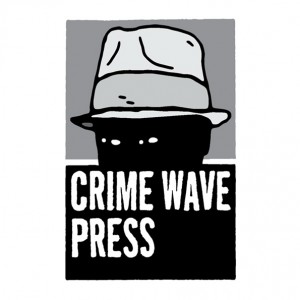Two friends, Tom Vater and Hans Kemp, have recently launched Crime Wave Press, in Hong Kong. Here Tom explains
how they began their publishing (ad)venture.
In the summer of 2012,
Hans and I were sitting in Bangkok talking about the changing world of
publishing and the new challenges facing small independent publishers and
writers. We had just collaborated on a successful illustrated book, Sacred Skin, Thailand’s Spirit Tattoos, for his Hong Kong based publishing house, Visionary World. Meanwhile, I had just had the rights to my first
novel, The Devil’s Road to Kathmandu, returned to me by a local publisher. I was also sitting on a crime novel, The Cambodian Book of the Dead, I had not yet managed to
sell.
Our conversation went
something like this.
“Why don’t we start a
crime fiction imprint?”
“We could specialise in crime fiction from Asia. There’s bound to be lots of
writers out here trying to find a publisher. And there’s plenty of crime to
write about.”
“And we’d have two
titles to start with immediately.”
“We could call it Crime
Wave Press.”
It was really as easy as
that. Well, sort of. Well, not quite.
In 2012, there were already a number of
small crime fiction imprints in the West, publishing mostly eBooks, but there weren’t any in Asia. Both Hans and I had lived in the region for many years and both
of us had had long and independent careers in media. Hans started out as a
photographer in Hong Kong and Vietnam, then became a successful publisher of
his own illustrated books, most notably Bikes of Burden, a collection of
images of motorbikes in Vietnam, which is currently published in four
languages. I have a long history of writing features for newspapers and
magazines, documentary screenplays, non-fiction books, all with a focus on
Asia. Hans came
up with the perfect tag line for our piratical endeavour: It’s always too
late for someone.
And so, with just a couple
of titles - mine - Asia’s first boutique crime fiction imprint was launched with some
fanfare at the Ubud Writers and Readers Festival in Bali in October 2012. We had a great start, hanging out with Nick
Cave, John Pilger and Colin Falconer, schmoozing with agents and feeling
like, well, publishers. And it just seemed to get better.
Within weeks of having
our first two titles online either as eBooks or as print editions through print on demand, we sold The Cambodian Book of the Dead to British publisher Exhibit A Books. Shortly after we
sold the Spanish language rights to The Devil’s Road to Kathmandu to
Editorial Xplora. And we got lucky again by signing the Father Ananda Mystery series by Nick Wilgus, which had been published in Thailand a decade earlier. Now we
had a handful of titles, we were organising promotions, interviews, podcasts
and we began to shift some copies.
But we received no
submissions. Well, that’s not entirely true. We did receive some bar girl
novels set in Thailand, quite a few Vietnam War reminiscences by former US
soldiers and a handful of titles so badly written we could not even get
through the first page, a 120,000 word manuscript on Satanism amongst them.
It’s part of our company policy not to publish right wing, racist, sexist or
otherwise demeaning fiction. That cancelled out the bar girl novels and most of
the war stories. We blogged, we tweeted, we Facebooked, we networked and we
sent out thousands of emails. We travelled to the Frankfurt Book Fair. We
reached out to literary connections in Japan and India. We cajoled our friends
to write novels. And our slush pile remained just that – a pile of low quality
slush.
Granted, we found Jame
Dibiasio’s excellent Gaijin Cowgirl,
the incredible adventure of Val Benson, Tokyo hostess, World War II treasure
hunter and a wonderful, if reckless, female protagonist who will be back in a
follow-up at the end of the year. But that was pretty much it. We couldn’t find
any more crime novels set in Asia. Crime Wave Press, it seemed, was stuck.
In late 2013, I
connected with my friend, writer James Newman, who had also started up a small
publishing imprint, Spanking Pulp Press. James didn’t seem to have as
much of a problem attracting writers, despite not being able to offer advance
payments, just like us. He did throw his net wider though, signing any pulp
genre fiction from anywhere. Hans and I had to make a difficult decision –
carry on publishing a few criminal tales from Asia or broaden our submissions
policy and accept crime fiction from all over the world to expand our catalogue. We went for the world.
Crime Wave Press is now
reading manuscripts for whodunits, noir and hardboiled, historical mysteries
and espionage thrillers, literary crime, pulp fiction, highly commercial
page turners and marginal texts exploring cultural underbellies from around the
world. The slush pile has grown and so has the quality of the work we receive.
Since changing the
policy we have signed five new writers. Ironically the first two titles we
publish this year have strong Asian connections. Skewered And Other London Cruelties, by Benedict J Jones, just out, is set in London’s Asian community. Salaryman Unbound, by Ezra Kyrill Erker takes place in Japan.
But those elusive great
books, the ones that have a special quirk, a singular tone, a narrative arc
that swings like a jazz beat and an immediacy that cuts like a knife, those
remain rare discoveries. Crime Wave Press
is looking for great manuscripts. We plan to publish 24 titles this year – if
we can find 24 great crime novels.

